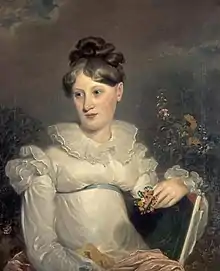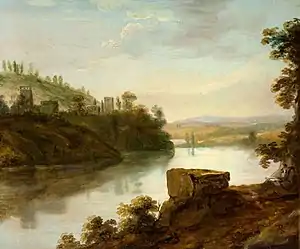Charlotte Nasmyth
Charlotte Nasmyth (17 February 1804 – 26 July 1884) was a Scottish painter whose works were regarded at the time as "gems", and which are now included in the collections of the Scottish National Gallery and other museums.
Charlotte Nasmyth | |
|---|---|
 Charlotte Nasmyth by William Nicholson, 1827 | |
| Born | 17 February 1804 Edinburgh, Scotland |
| Died | 26 July 1884 (aged 80) Putney, England |
| Nationality | Scottish |
| Known for | Painting |
Biography
Charlotte was born in St Andrew's parish, Edinburgh, one of eleven children, including six daughters, of Alexander Nasmyth,[1][2] the "foremost landscape artist of his day".[3]
Charlotte, in common with her siblings Patrick, Jane, Barbara, Margaret, Elizabeth, and Anne, worked as a studio assistant to her father in Edinburgh, and also taught art classes.[1][4] After the death of their father in 1840, his legacy and an auction of 155 of the family's paintings gave the Nasmyth sisters financial independence, and enabled them move to England.[1] Between 1831 and 1866, Charlotte exhibited her romantic landscapes[4] and other works at the Royal Scottish Academy, the Royal Society of British Artists, the Royal Academy, and other institutions.[2] She painted mainly in oils, and sometimes in watercolours,[1] and also produced some etchings.[5] Her subjects include landscapes of north Wales and various regions of England, as well as Scotland, indicating that she travelled widely throughout Britain.[1] She was the most prolific artist of the six sisters.[1][2] Modern writers have described her as "the most flamboyant and wildest",[3] working "with a greater freedom and panache than her sisters".[1] Contemporary reviewers described Charlotte's paintings as "little gems",[6][7] "delicious small-room pictures ... meant to .. form the individual treasure of some limited sphere of its own."[8] Gnarled tree trunks with broken branches were a favourite subject of Charlotte's,[1] and a reviewer in 1866 wrote of one of her landscapes, "This is the finest bit of tree painting in the exhibition; vigorous, crisp, and beautiful in colour."[9]
Charlotte died in Putney, Surrey, in 1884.[1]
A portrait of Charlotte by William Nicholson is in the collection of the National Galleries Scotland,[4] and another by Andrew Geddes[10] is in the British Museum.
Works

Works by Charlotte are held by the Scottish National Gallery,[11][12] the British Museum,[5] the University of Dundee Fine Art Collections,[13] Alloa Tower (the National Trust for Scotland),[14] and Hill Top and the Beatrix Potter Gallery (the National Trust).[15][16]
Selected works
- Highland Pass[1]
- Hampstead Heath[1]
- Musselburgh[1]
- The Bay of Naples[1]
- Pastoral Landscape[11]
- Kincardine Castle, Perthshire[13]
- View of Alloa and Stirling Castle from Clackmann Hill[14]
- The Entrance to Loch Katrine[15]
- At Barnes, near Putney[6]
- Penshurst Park, Kent[6]
- Near Penryn, North Wales[17]
- A Wooded Landscape with Travellers on a Path[18]
- View in Essex[19]
- Derwent Water[19]
- Strathearn, Perthshire[19]
- Burnham Beeches[20]
- Mill at Barton, Lancashire[21]
- Cottage in Epping Forest[21]
- Distant View of London from Norwood[21]
- Cottage of North Hope, North Wales[22]
References
- Cooksey, J. C. B. (23 September 2004). "Nasmyth Family, (per. 1788–1884), painters and art teachers: Charlotte Nasmyth". Oxford Dictionary of National Biography. Oxford Dictionary of National Biography (online ed.). Oxford University Press. doi:10.1093/ref:odnb/75558. Retrieved 15 March 2019. (Subscription or UK public library membership required.)
- Gray, Sara (2009). "Nasmyth, Misses Anne Gibson, Barbara, Charlotte, Elizabeth Wemyss, Jane, and Margaret: Charlotte Nasmyth". The Dictionary of British Women Artists. Casemate Publishers. p. 194. ISBN 9780718830847. Retrieved 15 March 2019.
- Nedanic, Stana (2006). "NASMYTH, Charlotte". The Biographical Dictionary of Scottish Women. Edinburgh: Edinburgh University Press. ISBN 978-0-7486-3293-0.
- "William Nicholson: Charlotte Nasmyth, 1804 - 1884. Artist". National Galleries Scotland. Retrieved 15 March 2019.
- "Prints by Charlotte Nasmyth". The British Museum. Retrieved 15 March 2019.
- "Royal Scottish Academy's Exhibition". Caledonian Mercury. 3 April 1858. p. 3. Retrieved 16 March 2019.
- "Fine Arts". Newcastle Journal. 7 July 1864. p. 2. Retrieved 16 March 2019.
- "Exhibition of the Royal Scottish Academy". The Scotsman. 24 April 1844. p. 4. Retrieved 16 March 2019.
- "Exhibition of Works of Art at the Music Hall". Shrewsbury Chronicle. 21 September 1866. p. 6. Retrieved 16 March 2019.
- "Half-length portrait of Miss Charlotte Nasmyth; Drawn by: Andrew Geddes". The British Museum. Retrieved 15 March 2019.
- "Pastoral Landscape. Charlotte Nasmyth (1804–1884), National Galleries of Scotland, Scottish National Gallery". ArtUK. Public Catalogue Foundation. Retrieved 15 March 2019.
- "Charlotte Nasmyth: Pastoral Landscape". National Galleries of Scotland. Retrieved 15 March 2019.
- "Kincardine Castle, Perthshire. Charlotte Nasmyth (1804–1884), University of Dundee Fine Art Collections". ArtUK. Public Catalogue Foundation. Retrieved 15 March 2019.
- "View of Alloa and Stirling Castle from Clackmann Hill. Charlotte Nasmyth (1804–1884), National Trust for Scotland, Alloa Tower". ArtUK. Public Catalogue Foundation. Retrieved 15 March 2019.
- "The Entrance to Loch Katrine. Charlotte Nasmyth (1804–1884), National Trust, Hill Top and the Beatrix Potter Gallery". ArtUK. Public Catalogue Foundation. Retrieved 15 March 2019.
- "Walk: Loch Katrine, Stirlingshire". Countryfile Magazine. 3 September 2018. Retrieved 15 March 2019.
- Harris, Elree I.; Scott, Shirley R. (2013). A Gallery of Her Own: An Annotated Bibliography of Women in Victorian Painting. Routledge. pp. 142–143. ISBN 9781135494346. Retrieved 16 March 2019.
- Greer, Germaine (2001). The Obstacle Race: The Fortunes of Women Painters and Their Work. Tauris Parke Paperbacks. p. 20. ISBN 9781860646775. Retrieved 16 March 2019.
- The Art-union, Volume 7. W. Thomas. 1845. p. 348. Retrieved 16 March 2019.
- Nunn, Pamela Gerrish (1987). Victorian women artists. Women's Press. pp. 32–33. ISBN 9780704350151. Retrieved 16 March 2019.
(Charlotte Nasmyth's 'Burnham Beeches', 1861)
- Exhibition of the Royal Scottish Academy, Volume 15. Royal Scottish Academy. 1841. pp. 11, 15, 24. Retrieved 16 March 2019.
- Trevelyan, Lady Paulina Jermyn (1879). Selections from the literary and artistic remains of Paulina Jermyn Trevelyan. Ed. by D. Wooster. p. 128. Retrieved 16 March 2019.
External links
 Media related to Charlotte Nasmyth at Wikimedia Commons
Media related to Charlotte Nasmyth at Wikimedia Commons- images of Charlotte Nasmyth's paintings on ArtNet